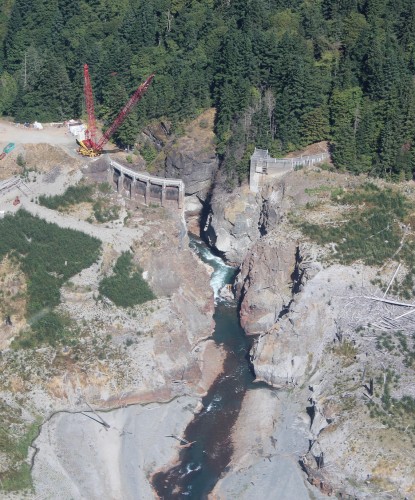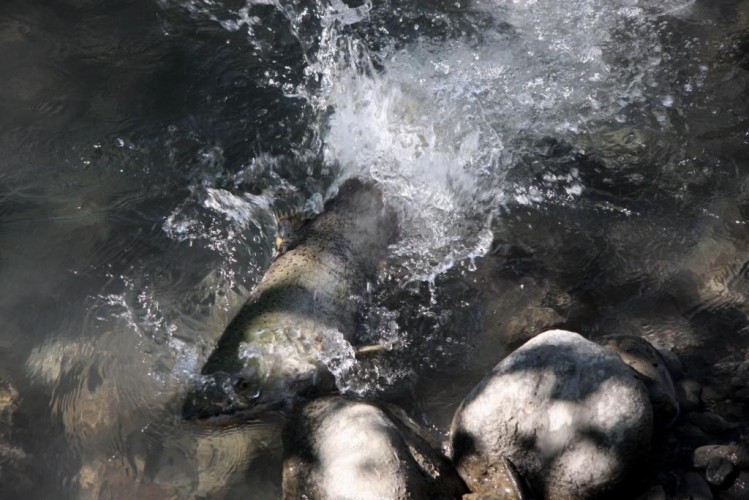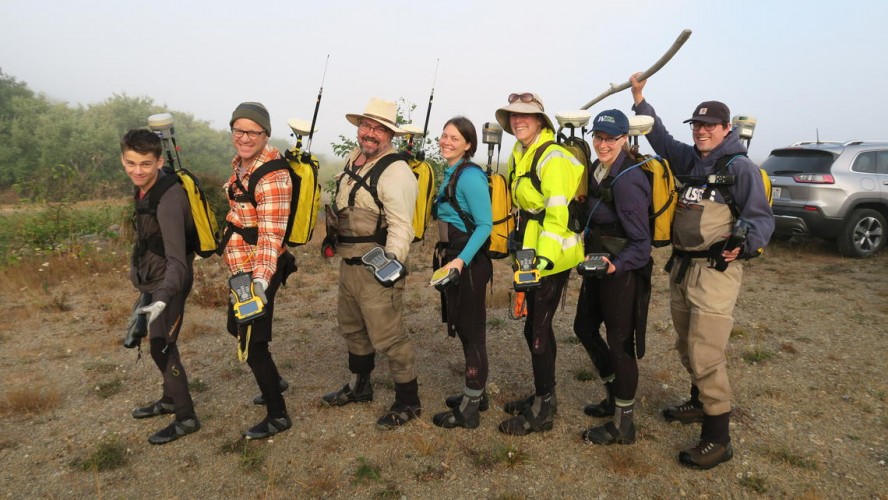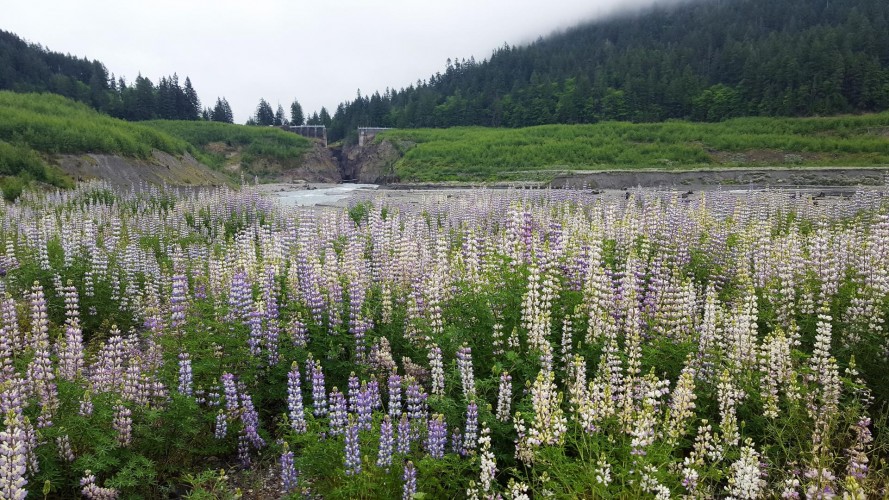Project Update: Center for Community and Citizen Science supports expanded efforts in participatory monitoring of the Elwha River dam removal
On April 18-19th, 2022, researchers from the Center joined the scientific community working on the Elwha River in Washington State to think through the potential for growing public participation in future monitoring of the largest dam removal project in the world.
“Elwha be free”
 The Elwha River runs from
south to north on the Olympic Peninsula, emptying into the Strait
of Juan de Fuca at the Lower Elwha Klallam Tribal Reservation
near Port Angeles, WA. The upper 83% of the watershed lies in
Olympic National
Park. Two dams were built on the river in 1913 and 1927,
largely to provide electricity for the local lumber and paper
industry which in the 21st century could be obtained elsewhere.
Between 2011 and 2014 – driven by concerns over declining fish
populations, coastal erosion, and safety – these
dams were removed, marking the largest such dam removal and
watershed-level restoration project to date. The project
required extensive coordination between Tribal, agency,
academic, and non-governmental organization scientists (among
others). The removal of the dams is featured in the documentaries
“DamNation” and “Return of the River.”
The Elwha River runs from
south to north on the Olympic Peninsula, emptying into the Strait
of Juan de Fuca at the Lower Elwha Klallam Tribal Reservation
near Port Angeles, WA. The upper 83% of the watershed lies in
Olympic National
Park. Two dams were built on the river in 1913 and 1927,
largely to provide electricity for the local lumber and paper
industry which in the 21st century could be obtained elsewhere.
Between 2011 and 2014 – driven by concerns over declining fish
populations, coastal erosion, and safety – these
dams were removed, marking the largest such dam removal and
watershed-level restoration project to date. The project
required extensive coordination between Tribal, agency,
academic, and non-governmental organization scientists (among
others). The removal of the dams is featured in the documentaries
“DamNation” and “Return of the River.”
The Elwha has undergone a remarkable restoration trajectory.
After dam removal, sediment previously held behind the dams
flowed downriver into the Strait of Juan de Fuca within months
(rather than years),  forming
a delta at the rivermouth and extending available freshwater
habitat near Port Angeles. Several species of salmon and trout
quickly moved up past the dams to access traditional spawning
habitat, though some other species have yet to do so. Passive and active
revegetation efforts on the former reservoirs have led to a
community of well-established trees and other plants, providing habitat
and food for deer and elk, small mammals, and larger
predators like mountain lions.
forming
a delta at the rivermouth and extending available freshwater
habitat near Port Angeles. Several species of salmon and trout
quickly moved up past the dams to access traditional spawning
habitat, though some other species have yet to do so. Passive and active
revegetation efforts on the former reservoirs have led to a
community of well-established trees and other plants, providing habitat
and food for deer and elk, small mammals, and larger
predators like mountain lions.
Elwha ScienceScape
Beyond the initial rapid changes occurring in the watershed, the
effects of dam removal on the Elwha will continue to play out
over many decades. To mark the ten-year anniversary of the
removal of the dams, the scientific community is planning to come
together in a coordinated sampling effort this fall, called
“Elwha ScienceScape,”  that seeks to continue long-term restoration monitoring and to
synthesize data collected to date. Elwha ScienceScape is led by
scientists from a variety of disciplinary backgrounds, including
geomorphology, plant ecology, wildlife ecology, fish ecology, and
scholars of both marine and freshwater environments. This effort
intends to inspire and connect a new generation of researchers to
those who have studied the river for decades (some of whom are on
the way to retirement) and rejuvenate enthusiasm for long-term
monitoring. In addition, as most of the agency-based funding
sunsets, there is a need to find ways to support ongoing
monitoring into the future as the river continues to evolve. One
possible pathway for this is to foster various forms of public
participation.
that seeks to continue long-term restoration monitoring and to
synthesize data collected to date. Elwha ScienceScape is led by
scientists from a variety of disciplinary backgrounds, including
geomorphology, plant ecology, wildlife ecology, fish ecology, and
scholars of both marine and freshwater environments. This effort
intends to inspire and connect a new generation of researchers to
those who have studied the river for decades (some of whom are on
the way to retirement) and rejuvenate enthusiasm for long-term
monitoring. In addition, as most of the agency-based funding
sunsets, there is a need to find ways to support ongoing
monitoring into the future as the river continues to evolve. One
possible pathway for this is to foster various forms of public
participation.
April Workshop
The Elwha scientific community convened to discuss opportunities for continued interdisciplinary research during the Elwha ScienceScape’s kick-off workshop in April. At their request, researchers from the Center for Community and Citizen Science facilitated conversations about the integration of community and citizen science (CCS) into plans for Elwha ScienceScape monitoring activities.
We spoke with the scientists leading the ScienceScape effort in the months leading up to the virtual April workshop, learning about existing and potential CCS projects. During the workshop, we featured some of these projects:
- Assistance with camera trap data collected for a Lower Elwha Klallam Tribal project
- Potential water quality monitoring by the nearby Olympic NatureBridge campus during its summer programs with schools
- Possible engagement with other non-governmental organizations for continuing subtidal dive-based monitoring
- Engaging with local birding groups to track changes in bird communities at the mouth of the river and in the estuary
- Generating training data for classification of remote sensing images of the river’s evolution over the last decade
- Ideas around iNaturalist, eBird, and photo-point/photo resurvey projects
As we discussed ideas for expanding CCS in the Elwha, we were
struck by the enthusiasm and collaborative approach of the Elwha
scientific community in attendance at the workshop. As the summer
proceeds, we will look forward to further engagement and support
of CCS on the Elwha, leading up to the Symposium to be held at
the end of August 2022! 








